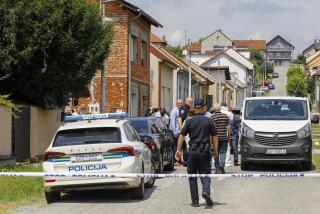Suspect in Serb Assassination Held
- Share via
BERLIN — The government of Serbia said Tuesday that it had arrested the man suspected of firing the bullet that killed Prime Minister Zoran Djindjic two weeks ago.
The alleged sniper, Zvezdan Jovanovic, was the deputy commander of a Serbian paramilitary group that had been established under former President Slobodan Milosevic and had ties to organized crime, said Serbia’s new premier, Zoran Zivkovic. The group is accused of perpetrating some of the worst atrocities of the Yugoslav wars in the 1990s.
Zivkovic told reporters in Belgrade, the Serbian capital, that authorities had arrested Jovanovic on Monday. Investigators also recovered a rifle believed to have been used in the sharpshooter attack on Djindjic, who died in an ambush outside government headquarters March 12.
The government blames the assassination on an organized gang called the Zemun clan, whose ranks include former and active members of the Serbian special forces, or Red Berets. Another member of the paramilitary group, Sasa Pejakovic, was arrested along with Jovanovic.
Using broad powers granted by a government-declared state of emergency, police in Serbia have so far rounded up hundreds of people suspected of direct or indirect involvement in Djindjic’s slaying. But the supposed mastermind of the plot, Milorad Lukovic, a former commander of the Red Berets, remains a fugitive.
“This is not the end of the investigation,” Zivkovic said. “We are happy with what has been done, but we won’t be satisfied until all those involved in this murder are arrested and tried.”
Under Lukovic, the Red Berets are reputed to have committed terrible acts of “ethnic cleansing” against Muslims in Bosnia-Herzegovina and ethnic Albanians in the Serbian province of Kosovo during the Balkan civil wars. When the wars ended, many of the erstwhile paramilitaries turned to organized crime, which thrived under an uneasy detente with the government.
Djindjic was preparing to launch a crackdown on the gangs on the day he was shot.
Signaling that the crackdown will continue despite his assassination, the government announced Tuesday that the special operations unit, which had managed to stay active under Djindjic, is to be disbanded. All members were “ordered to return weapons, equipment, uniforms and official ID cards,” the government said.
The unit’s commander, Dusan Maricic, was dismissed and “detained for further investigation” because of his links with the clan accused of orchestrating Djindjic’s murder, Zivkovic said.
A Belgrade radio station reported Tuesday that the assassination was the Zemun clan’s fifth attempt at killing Djindjic.
The slain prime minister had earned enemies through his political and economic reforms and his pro-Western stance, which had prompted him to turn over Milosevic to the international war crimes tribunal in The Hague in exchange for billions of dollars in promised foreign aid.
Analysts say that Djindjic’s killers, as former paramilitaries, might have gunned him down as much for fear of being arrested and sent to the tribunal as of a crackdown on their activities in organized crime, such as drug trafficking.
At The Hague on Tuesday, the commander of another Serbian paramilitary group pleaded not guilty to charges that his troops had tortured and killed non-Serbs.
Vojislav Seselj, 48, was indicted on 14 counts of crimes against humanity and violation of wartime conventions during the Balkan civil wars.
A former ally of Milosevic, Seselj was head of a paramilitary group known as the Chetniks, believed responsible for widespread killing in the Balkans in the early 1990s.
*
Special correspondent Zoran Cirjakovic in Belgrade contributed to this report.
More to Read
Sign up for Essential California
The most important California stories and recommendations in your inbox every morning.
You may occasionally receive promotional content from the Los Angeles Times.














